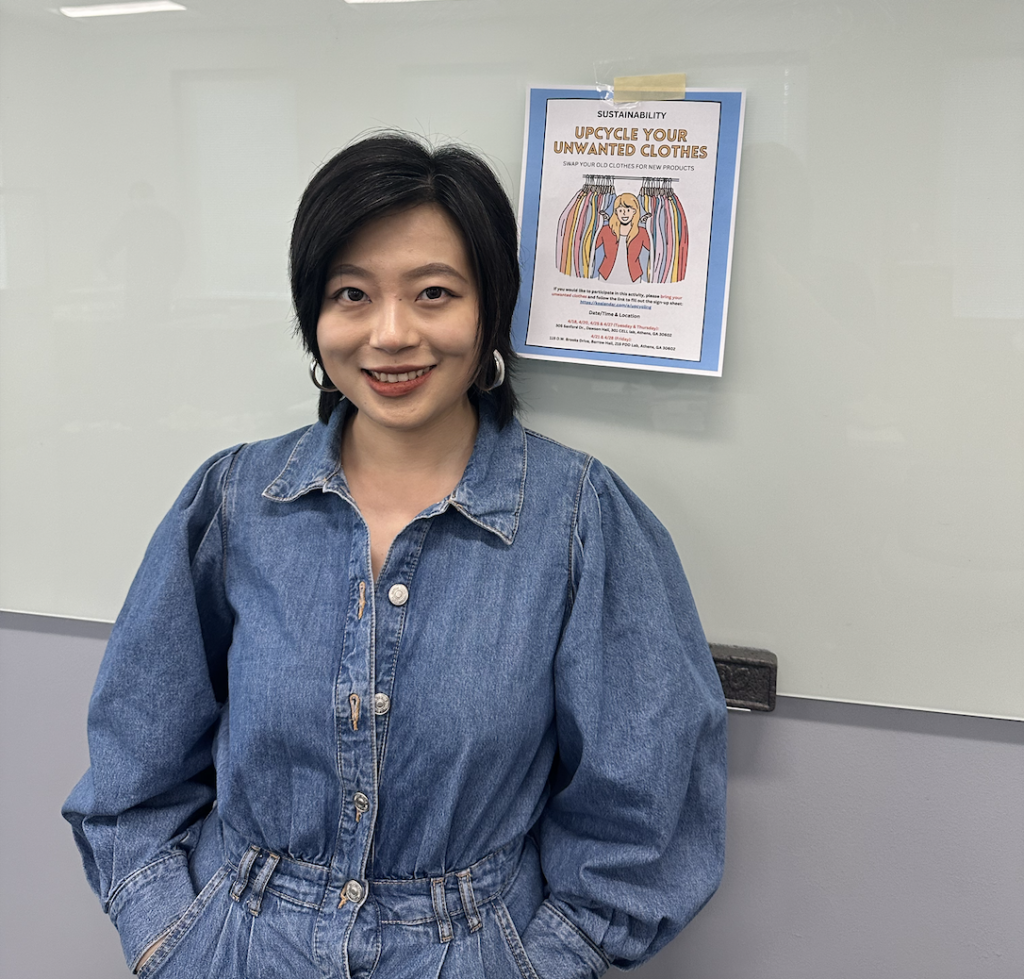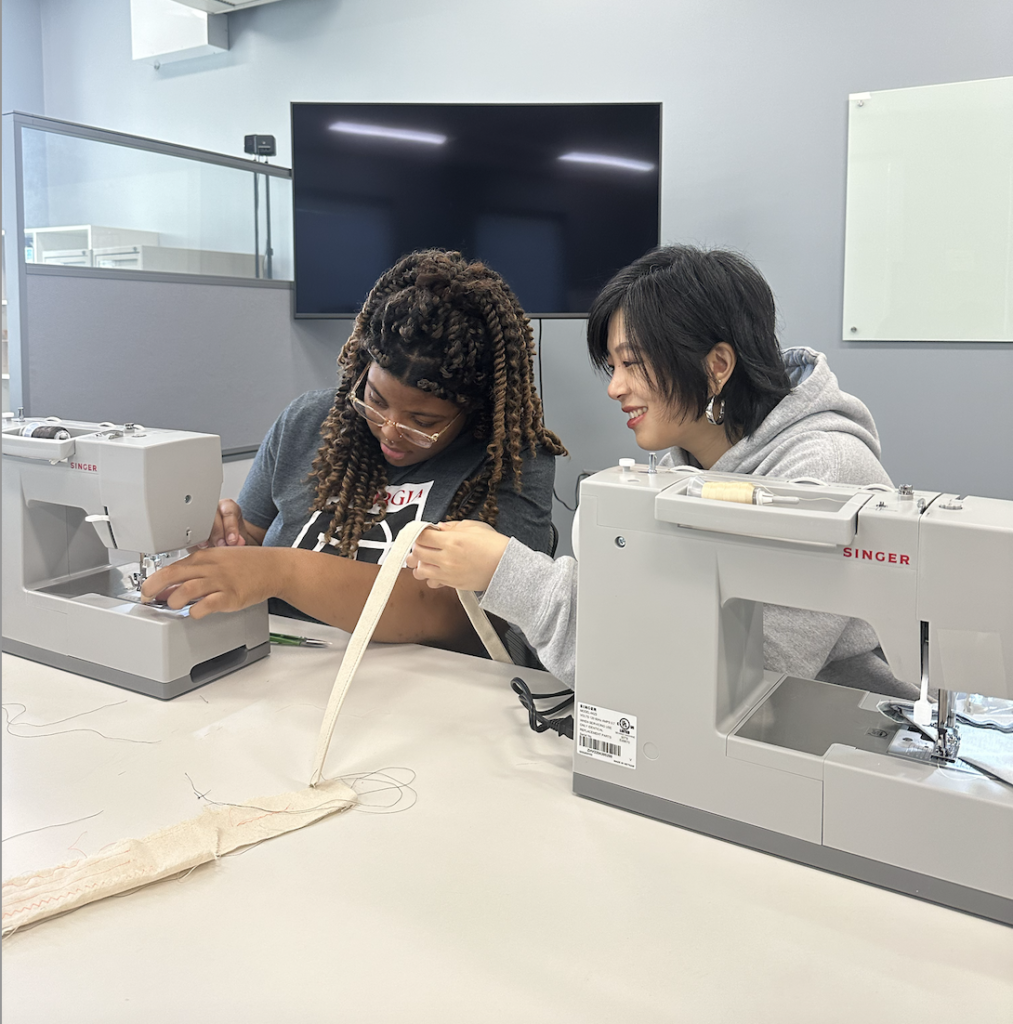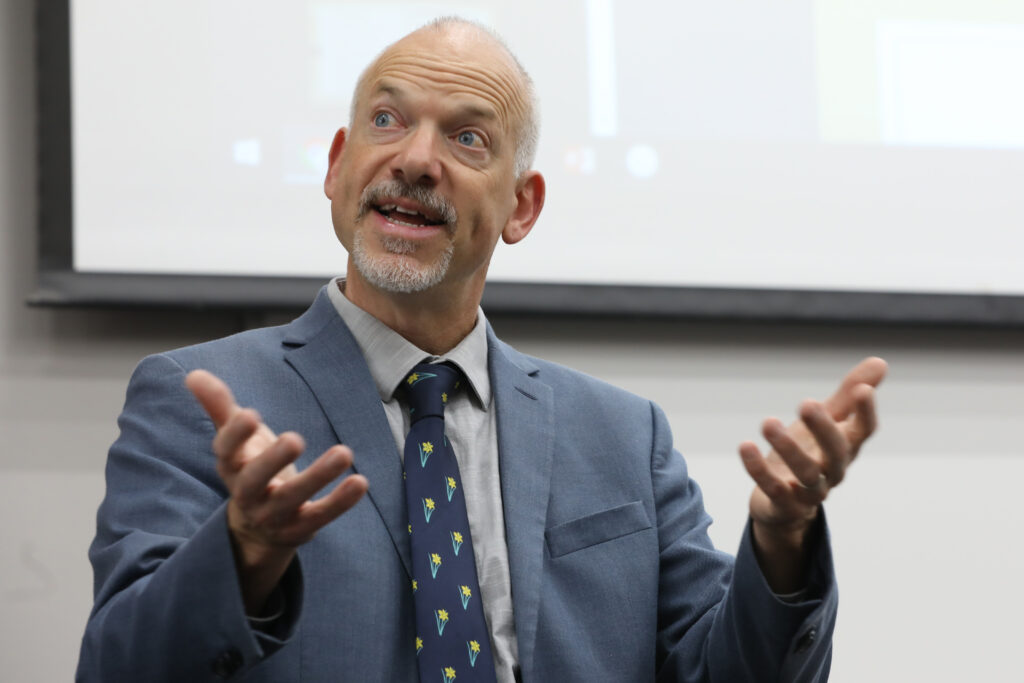Caroline Kostuch

Ziyou Jiang, UGA Ph.D. candidate and campus sustainability grant winner, poses in front of her clothing upcycle program flyer. The program invites students to drop off unwanted clothes and turn them into new items they will use. (Photo/Caroline Kostuch)
Ziyou Jiang welcomes students into the activity lab with a smile as they stop by to drop off old clothing pieces and give them a new life. She wears a gray hoodie and black leggings elevated with classic silver hoops and platform Prada sneakers as she teaches participants how to reinvent and reattach to once loved items.
Jiang sets up one student to take a reflective survey about the experience while another student works at the sewing machine. She joins the student at the machine, talking to her about classes, hobbies and more as they turn an old camouflage t-shirt into a tote bag.
“Upcycling Education: Give your clothes an unintended second life” is a program and research study that allows students to bring in unwanted clothing and create a new item out of the material with the guidance of project leaders. The upcycling program, led by Jiang alongside Yujun Lin and Yinan Liang, received a 2022-2023 Campus Sustainability Grant from the university. The workshops take place on campus at the Consumer Experience Learning Lab and the Product Development and Design Lab.
Jiang is a third-year Ph.D. candidate and graduate teaching assistant at the University of Georgia studying polymer, fiber and textile science with an emphasis in international merchandising. She teaches classes and conducts research, yet she found the time to lead the upcycling education program and use her experience in fashion to make a larger impact.
“I know it is a very important topic and a popular topic as well because it’s regarding our environment, our living environment,” Jiang said.
Jiang’s relationship with fashion and textiles dates back to 2010. Jiang received her bachelor’s degree in fashion design from Dalian Polytechnic University, just four hours away from her hometown of Shenyang, China. After graduating, she made the decision to move to the United States and pursue her dreams of further education.
“There’s two different parts: one part is I will miss my parents and my other friends, the other part is I will have a new life in different cities and different countries,” Jiang said.
Jiang moved to San Francisco and earned a master’s degree in fashion merchandising from the Academy of Art University before attending her long-term dream school Parsons School of Design in New York where she earned her master’s degree in strategic design and management.
With both of her parents being professors at universities in China and multiple close family members having doctorates of their own, Jiang felt influenced to keep expanding her knowledge. She decided to apply to the polymer, fiber and textile science Ph.D. program at UGA.
Jiang’s husband wanted to pursue his doctorate in sports management, so they searched for the best schools in the nation offering both programs and applied. After they both got into their programs at UGA, they moved to Athens.
The upcycling education program has been a relaxing escape for Jiang from the pressure of school as she teaches students to sew while also promoting sustainability in fashion.
“Research is so hard for me and sometimes makes me feel stressed,” Jiang said. “I think [the upcycling program] makes me happier and releases some of my stress.”
85% of all textiles end up in landfills each year, according to the Environmental Protection Agency. Sustainable fashion is becoming more relevant than ever, drawing attention to Jiang’s upcycling project.
Jiang doesn’t just teach students to sew, but provides a positive experience in sustainability and mental health. After over ten years of higher education, Jiang sees her future in fashion consulting or teaching as a professor.
“I’ve never seen a Ph.D. student like her,” said Jewon Lyu, Ph.D. advisor for Jiang and assistant professor in textiles, merchandising and interiors. “She’s a go-getter.”
The upcycling education activity workshop was open to participants for two weeks, welcoming students wanting to help contribute to sustainable practices and take a break from school.

Kyla Stallings, second-year UGA student, works with Jiang to create a tote bag out of an old t-shirt. Jiang guides each student through the upcycling process, whether it is their first-time sewing or if they have prior experience. (Photo/Caroline Kostuch)
Why I Wrote the Story:
During spring 2023, I was assigned to cover the sustainability beat in my reporting and writing across platforms course. One of our last assignments was to profile a person related to our beat, so I found Jiang and her work. With this being the first profile I have completed on my own, I learned in-depth interview skills as well as how to write for features rather than hard news.
